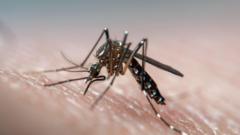In a groundbreaking move that raises a multitude of ethical questions, the Wellcome Trust has initiated a controversial project aimed at creating artificial human DNA from scratch. This unprecedented endeavor, announced on the 25th anniversary of the Human Genome Project, has garnered initial funding of £10 million and aims to produce the foundational elements of human life in a laboratory setting. The project seeks to potentially revolutionize medicine by developing therapies for previously incurable diseases and improving quality of life as people age.
Dr. Julian Sale, from the MRC Laboratory of Molecular Biology in Cambridge, remarked that the research could lead to the generation of disease-resistant cells capable of restoring function to damaged organs such as the liver and heart, and even enhancing immune responses. However, the initiative has sparked substantial concern among critics regarding the possibility of misuse, including the risk of creating enhanced or modified humans or even biological weapons.
Dr. Pat Thomas, director of the campaign group Beyond GM, expressed alarm about the potential ramifications, stating, “While we hope that scientists act with good intentions, the science can be misappropriated for harmful purposes.” As researchers endeavor to develop larger constructs of human DNA, the potential to manipulate the building blocks of life raises urgent ethical issues that must be addressed.
At its core, the initiative—dubbed the Synthetic Human Genome Project—aims to construct segments of DNA that govern human development and health. Prof. Matthew Hurles, director of the Wellcome Sanger Institute, noted that the capacity to create DNA from the ground up allows scientists to explore genetic functions and conditions that lead to diseases more thoroughly than current practices allow. Despite its potential to advance medical science, there remain looming questions regarding the safe commercialization of resultant technologies.
The initiative is designed to operate within controlled laboratory environments, emphasizing that there will be no attempts to create synthetic life forms. Nevertheless, ethics experts warn that the controls could be inadequate against the threats posed by rogue researchers. Prof. Bill Earnshaw, an esteemed genetic scientist, indicated that technological advancements could easily be exploited if appropriate safeguards are not implemented.
Moreover, concerns abound regarding intellectual property as healthcare and biotech companies rush to commercialize any advancements emerging from this research. Questions regarding ownership of synthetic body parts and the associated data loom large, emphasizing the need for clear governance and regulatory frameworks.
Dr. Tom Collins of the Wellcome Trust acknowledged the gravity of these concerns, noting, “We reflected on the implications of inaction. This technology is likely to be developed eventually. We believe it’s essential to confront the ethical dilemmas now, rather than defer them.” To address these issues proactively, a dedicated social science program is set to accompany the project, with sociologist Prof. Joy Zhang leading efforts to gauge public perceptions and express concerns about this revolutionary but contentious field of research.
As the scientific community embarks on this ambitious project, the intersection of technological innovation, ethical considerations, and public sentiment will be crucial in shaping the future of genetic research.








